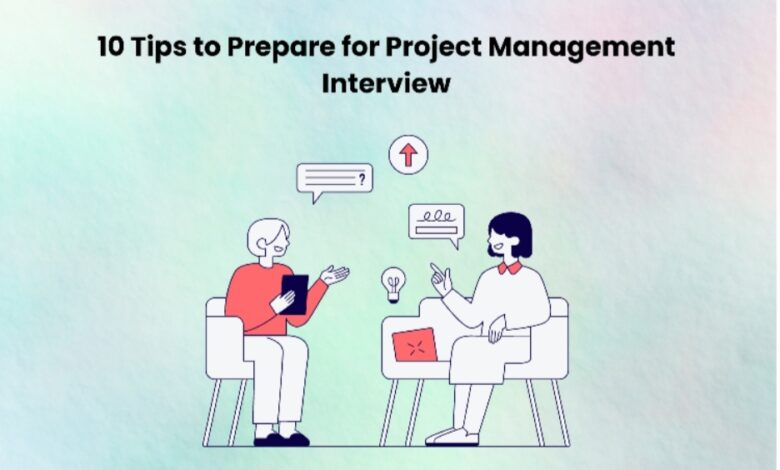10 Tips to Prepare for Project Management Interview

Getting hired for a Project Management Interview project management position involves more than simply having a great CV. Interviews for project management positions are demanding and competitive, often evaluating individuals’ abilities, backgrounds, and suitability for the position and company. To succeed in this environment, great expertise to crack interviews is essential.
In this blog we will explore ten tips to help you prepare effectively for your Project Management Interview. These tips will provide the information and self-assurance you need to master the interview, from comprehending the job description to highlighting your project management abilities and expertise. These techniques will assist you in handling the interview process with professionalism and ease, regardless of your experience level or interest in project management. Also, we’ll explore the importance of the Project Management Course.
Table of Contents
- Tip 1: Understand the Job Description
- Tip 2: Research the Company and Industry
- Tip 3: Prepare Your Elevator Pitch
- Tip 4: Review Common Project Management Interview Questions
- Tip 5: Demonstrate Your Project Management Skills
- Tip 6: Familiarize Yourself with Project Management Tools and Methodologies
- Tip 7: Prepare to Discuss Your Projects and Achievements
- Tip 8: Practice Mock Interviews
- Tip 9: Stay Updated with Industry Trends
- Tip 10: Final Tips and Takeaways
- Conclusion
Tip 1: Understand the Job Description
Ensure you fully comprehend the job description before preparing for the interview. Keep an eye on the main duties, necessary abilities, and credentials the company seeks. This knowledge will assist you in modifying your interview replies to emphasise the relevant experiences and credentials that fit the position.
Examine the job description closely to completely understand the expectations for the position. Take note of the listed prerequisites for experience, education, and training. Draw attention to the areas in which your experience and the job criteria meet, and be ready to explain how your experience qualifies you for the role.
Tip 2: Research the Company and Industry
Demonstrating your genuine interest in the position and your willingness to contribute successfully may be achieved by thoroughly grasping the firm and its industry. Examine the organisation’s purpose, values, current initiatives, and market organisation. With this information, you can demonstrate compatibility with the company’s objectives and culture by asking perceptive questions during the interview.
Investigate the company’s background, culture, current events, and market trends. RecogRecognisecompany’s purpose, values, and objectives so that, throughout the interview, your responses will support those aims. You may also demonstrate your commitment and readiness by showcasing your understanding of the company’s rivals and the industry.
Tip 3: Prepare Your Elevator Pitch
Create a brief, engaging elevator pitch highlighting your career objectives, essential abilities, and work experience. Your elevator speech should be customised. The job and organ organisation you are interviewing with, emphasising your special talents and experiences, make you the best candidate.
Provide a brief, engaging elevator pitch highlighting your experience, qualifications, and desired career path. In your pitch, explain your project management experience and highlight particular accomplishments and areas of expertise pertinent to the position. Practise making a clear, concise pitch with confidence.
Tip 4: Review Common Project Management Interview Questions
Learn the typical questions asked during a project management interview, such as situational, behavioural, and technical. Use the STAR (Situation, Task, Action, Result) technique to format your answers properly. Be ready to provide precise instances from your prior encounters that highlight your problem-solving and project management aptitude.
Learn the most often asked interview questions for project management, including ones on your leadership style, ability to resolve conflict, knowledge of certain tools or software, and project planning approaches. Employ the STAR (Situation, Task, Action, Result) approach to organise answers using concrete instances from previous assignments.
Tip 5: Demonstrate Your Project Management Skills
During project management interviews, applicants’ abilities in decision-making, collaboration, leadership, and communication are often evaluated. Prepare to talk about how you used these abilities in prior positions, providing concrete instances of accomplished project goals and your part in their accomplishment.
Be ready to demonstrate your project management abilities during the interview, including your capacity for team leadership, clear communication, problem-solving, and risk management. Provide concrete instances of your past work to demonstrate how you’ve used these abilities, emphasising lessons learned.
Tip 6: Familiarise self with Project Management Tools and Methodologies
Proficiency in a variety of tools and processes is typically required for project management responsibilities. Learn about common project management tools (like Microsoft Project, Jira, and Trello) and approaches (like Agile, Scrum, and Waterfall) that relate to the position you’re looking for. Briefly explain how you have successfully managed projects using these tools and approaches.
Recognise many project management techniques and approaches—such as Agile, Scrum, Kanban, or Waterfall—pertinent to the work. Emphasise prior experience you may have had with these tools and processes, including how you planned, carried out and tracked projects using them.
Tip 7: Prepare to Discuss Your Projects and Achievements
Choose significant tasks and accomplishments from your work history that best illustrate your capacity for project management. Prepare a speech covering the project’s scope, role and duties, difficulties you encountered, steps you took, and outcomes you attained. You may increase the impact and recall of your comments by providing quantifiable results and accomplishments.
Choose a few standout projects from your portfolio that best showcase your talents as a project manager. Prepare to talk about the extent of each project, your duties and obligations, the difficulties you encountered, and how you overcame them. Emphasise accomplishments and how your efforts affected the project’s outcome.
Tip 8: Practice Mock Interviews
To replicate the interview experience, practise mock interviews with a friend, mentor, or career coach. Try to respond succinctly and clearly, project confidence while answering interview questions, and retain professionalism. Ask for criticism to pinpoint your weaknesses and improve your interviewing techniques.
To replicate the interview experience, practise mock interviews with a friend, mentor, or career coach. Pay attention to your body language and voice tone as you articulate your replies clearly and confidently. Refine your responses and hone your interviewing techniques by using feedback.
Tip 9: Stay Updated with Industry Trends
Keep up with the most recent advancements, trends, and best practices in project management. This indicates your dedication to lifelong learning and career advancement. Be ready to discuss how you incorporate these trends into your project management methodology and how they might help the company.
Keep up with the most recent advancements and trends in project management. This demonstrates your dedication to developing professionally and your capacity to adjust to changes in the field. Prepare a brief explanation of how you keep up with the latest developments and how they affect how you handle projects.
Tip 10: Final Tips and Takeaways
In the last part, we’ll wind up with some more advice and key points to help you prepare for your project management interview. We’ll review important success tactics, including keeping a positive outlook, conducting yourself professionally during the interview, and sending a thank-you email afterward.
We’ll end up with some more advice and key points in this series’s last instalment to help you prepare for your project management interview. We’ll review important success tactics, including keeping an optimistic outlook, showcasing your love for project management, and expressing excitement for the position and the business.
Conclusion
A project management interview calls for thorough preparation, study, and practice. You may exhibit your talents and expertise by reading through the job description, researching the business and industry, creating a strong elevator presentation, and preparing for typical interview questions.



